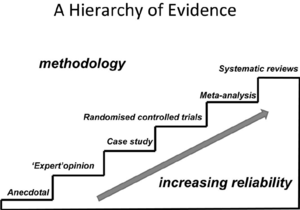Anecdotal Evidence Fallacy: Difference between revisions
mNo edit summary |
mNo edit summary |
||
| (One intermediate revision by the same user not shown) | |||
| Line 1: | Line 1: | ||
[[File:Anecdotal evidence fallacy.png|alt=Anecdotal evidence fallacy|thumb|Figure 1. Anecdotal evidence is the lowest form of information.]] | [[File:Anecdotal evidence fallacy.png|alt=Anecdotal evidence fallacy|thumb|'''Figure 1'''. Anecdotal evidence is the lowest form of information.]] | ||
'''The anecdotal evidence fallacy is when someone uses a personal experience or an isolated example instead of a sound argument or compelling evidence.''' | '''The anecdotal evidence fallacy is when someone uses a personal experience or an isolated example instead of a sound argument or compelling evidence.''' | ||
| Line 5: | Line 5: | ||
=== Example === | === Example === | ||
' | Let's say a person is considering a new diet plan and comes across anecdotal evidence from a friend: | ||
Friend: "I started a new diet where I only eat one type of fruit every day, and I've lost a significant amount of weight in just a week!" | |||
Instead of seeking more comprehensive and scientifically validated information on the effectiveness of various diet plans, the person decides to follow the same fruit-only diet based solely on their friend's anecdotal evidence. It would be better for the person to attribute a lower weight to the anecdotal evidence provided (as per '''Figure 1''') and move up a step to larger studies of the wider populace. | |||
== How to counter the Anecdotal Evidence Fallacy. == | == How to counter the Anecdotal Evidence Fallacy. == | ||
Latest revision as of 05:53, 30 December 2023
The anecdotal evidence fallacy is when someone uses a personal experience or an isolated example instead of a sound argument or compelling evidence.
Anecdotes can be be made up, misconstrued or be a statistical outlier which is insignificant when further evidence is considered.[1]
Example
Let's say a person is considering a new diet plan and comes across anecdotal evidence from a friend:
Friend: "I started a new diet where I only eat one type of fruit every day, and I've lost a significant amount of weight in just a week!"
Instead of seeking more comprehensive and scientifically validated information on the effectiveness of various diet plans, the person decides to follow the same fruit-only diet based solely on their friend's anecdotal evidence. It would be better for the person to attribute a lower weight to the anecdotal evidence provided (as per Figure 1) and move up a step to larger studies of the wider populace.
How to counter the Anecdotal Evidence Fallacy.
To get to the truth of any subject critical analysis techniques should be used to judge the authority of the information source.
References
- ↑ When and why do people act on flawed science? Effects of anecdotes and prior beliefs on evidence-based decision-making. Audrey L. Michal, Yiwen Zhong & Priti Shah. Cognitive Research: Principles and Implications volume 6, Article number: 28 (2021). Accessed on 15th September 2022 via https://cognitiveresearchjournal.springeropen.com/articles/10.1186/s41235-021-00293-2
